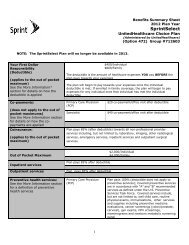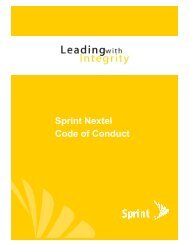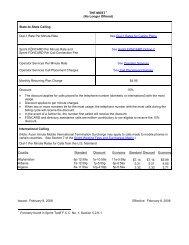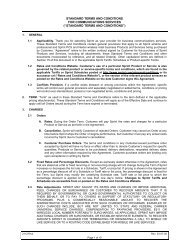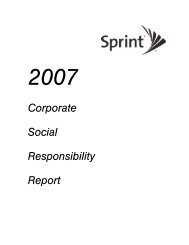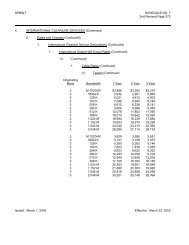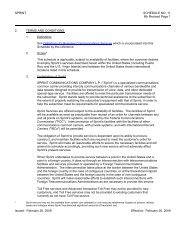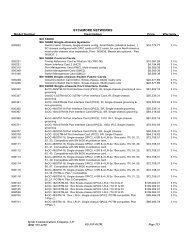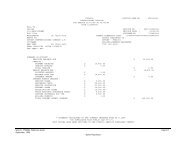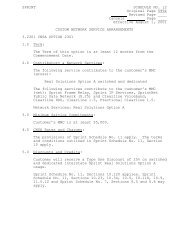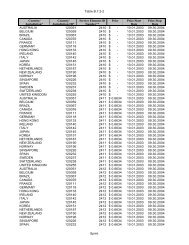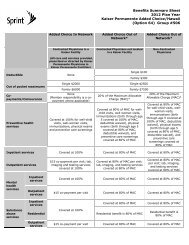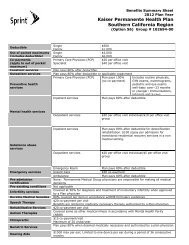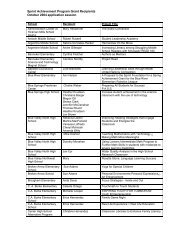SPRINT SIP TRUNKING SERVICE PRODUCT ANNEX
SPRINT SIP TRUNKING SERVICE PRODUCT ANNEX
SPRINT SIP TRUNKING SERVICE PRODUCT ANNEX
Create successful ePaper yourself
Turn your PDF publications into a flip-book with our unique Google optimized e-Paper software.
<strong>SPRINT</strong> <strong>SIP</strong> <strong>TRUNKING</strong> <strong>SERVICE</strong> <strong>PRODUCT</strong> <strong>ANNEX</strong><br />
The following terms and conditions in this Sprint <strong>SIP</strong> Trunking Service Product Annex (“Annex”), together with the applicable<br />
Sprint service agreement (“Agreement”), govern Sprint’s provision and Customer’s use of Sprint <strong>SIP</strong> Trunking Service.<br />
“Service” as used in this Annex will mean and refer to Sprint <strong>SIP</strong> Trunking Service. Capitalized terms not otherwise defined in<br />
this Annex have the meaning defined in the Agreement.<br />
1. <strong>SPRINT</strong> <strong>SIP</strong> <strong>TRUNKING</strong> <strong>SERVICE</strong>. This fixed Service provides Customer with the ability to aggregate its inbound and<br />
outbound voice traffic over Sprint’s Global MPLS network. This is accomplished by providing Customer with virtual VoIP<br />
trunks that carry local and long distance traffic to multiple destinations (“<strong>SIP</strong> Trunks”). The Service offers local calling over<br />
IP within the contiguous 48 states with long distance service within domestic U.S. The Service also offers international<br />
outbound termination. Additional usage charges will apply for international outbound termination. Special Services are not<br />
included. “Special Services” include, but are not limited to, 2XX, 3XX, 5XX, 6XX, and Premium Service NPAs 900 and<br />
976.<br />
1.1 Sprint <strong>SIP</strong> Trunking Toll Free. Sprint’s <strong>SIP</strong> Trunking Toll Free Service (“<strong>SIP</strong> Trunking Toll Free”) is integrated<br />
with Sprint <strong>SIP</strong> Trunking Service and allows toll free termination over <strong>SIP</strong> Trunks. However, Customer can<br />
purchase <strong>SIP</strong> Trunks that will only be used to carry toll free usage so long as Customer purchases a <strong>SIP</strong> Toll Free<br />
Trunk and a local telephone number for each location at which Customer purchases <strong>SIP</strong> Trunking Toll Free. <strong>SIP</strong><br />
Trunking Toll Free includes multiple routing capabilities. <strong>SIP</strong> Trunking Toll Free will route and deliver inbound toll<br />
free calls via Sprint’s Global MPLS network. As a result, many Customer-requested <strong>SIP</strong> Trunking Toll Free features<br />
are inherent within Customer’s Sprint Global MPLS network and equipment. <strong>SIP</strong> Trunking Toll Free is available<br />
wherever Sprint <strong>SIP</strong> Trunking Service is available.<br />
1.2 Caller ID. The Service is able to support non-emergency outbound calls that allow Customer-specified calling party<br />
identification (“Caller ID”) to be displayed to the party receiving the call. Sprint will associate a specific Customer<br />
telephone number to Customer-specified Caller ID calls and that telephone number will appear on Customer’s<br />
invoice to help ensure proper billing. If Customer experiences Caller ID issues that Sprint has identified and<br />
confirmed as relating to this functionality, Customer may contact Sprint to update the screening selection on all<br />
Customer calls, which Customer acknowledges may limit its Caller ID capabilities. Customer is responsible for<br />
configuring all of its equipment to support this Caller ID functionality. Customer releases Sprint from any and all<br />
liability in connection with the Caller ID functionality and Customer agrees to defend and indemnify Sprint from and<br />
against all claims associated with Caller ID functionality.<br />
2. ORDER TERM. The Order Term for the Service is stated in the Agreement. The Order Term is preceded by a Pre-<br />
Implementation Period (defined in section 2.1 below) and an Implementation Period (defined in section 2.2 below). The<br />
Pre-Implementation Period will begin on the date Customer places an Order for the Service. The Implementation Period<br />
will begin immediately after the Pre-Implementation Period ends. The Order Term will begin after the Implementation<br />
Period ends.<br />
2.1 Pre-Implementation Period. For approximately the first 60 days from the date Customer places an Order for the<br />
Service, Customer and Sprint will work together to create a plan for implementing the Service (“Pre-<br />
Implementation Period”). The parties will create a statement of work, which will include (a) an implementation<br />
plan, and (b) a technical network design plan (“Customer Statement of Work”). The Pre-Implementation Period<br />
will end on the day the last party signs the Customer Statement of Work.<br />
2.2 Implementation Period. After the Pre-Implementation Period, Sprint and Customer will begin implementing the<br />
Service (“Implementation Period”). For the Implementation Period, Customer must have purchased Sprint Global<br />
MPLS with enough bandwidth to accommodate Customer’s aggregated voice traffic in addition to its data traffic.<br />
Customer will cooperate in good faith with Sprint to fulfill all implementation requirements necessary to deploy the<br />
full-scale Service within 90 days of the date Customer signed the Customer Statement of Work. Implementation will<br />
be based on the Customer Statement of Work developed in the Pre-Implementation Period.<br />
3. <strong>SPRINT</strong> RESPONSIBILITIES<br />
3.1 Pre-Implementation Period. Sprint will:<br />
A. Provide project management, including coordinating with Customer on fulfillment of Customer’s<br />
responsibilities, as set forth below and—with Customer’s prior written approval—create and manage the<br />
Customer Statement of Work and all project plans.<br />
B. Pre-qualify Customer telephone numbers and locations for verification that Service is available at the locations.<br />
C. Provide Customer a technical network design, which will be part of the Customer Statement of Work. Sprint<br />
and Customer will agree to the Customer Statement of Work before Sprint begins implementing the Service.<br />
3.2 Implementation Period. Sprint will:<br />
A. Use commercially reasonable efforts to comply with Customer requests related to portability of existing local<br />
telephone numbers and toll free telephone numbers. Sprint cannot guarantee local number portability in all<br />
locations due to geographic limitations on the availability of the Service. Sprint will use commercially<br />
DM #545661v4 <strong>SPRINT</strong> PROPRIETARY INFORMATION Rev. 05/07/2012<br />
Page 1 of 5
easonable efforts to comply with Customer requests to port Customer’s existing non-Sprint and Sprint toll free<br />
numbers to <strong>SIP</strong> Trunking Toll Free. Sprint will promptly notify Customer if Sprint cannot port all of the<br />
requested numbers. If a number cannot be ported, Customer may terminate the impacted site without early<br />
Order Term termination liability.<br />
B. At Customer’s expense, install Sprint Global MPLS to the demarcation point for each site where Customer has<br />
ordered the Service.<br />
C. Provide test criteria agreed upon by Sprint and Customer for the Implementation Period, and will perform<br />
testing for final Customer acceptance of the Service.<br />
3.3 Service Assurance. Sprint will:<br />
A. Provide a 24/7/365 Tier 2 Help Desk (via a toll free number) to support the Service. Sprint’s help desk will<br />
answer calls from Customer’s telecom manager/designee and address issues within Sprint and its suppliers as<br />
needed to resolve the Service-related network specific issues.<br />
B. Maintain quality of service by performing preventative maintenance and software updates to Sprint’s network.<br />
C. Perform scheduled network maintenance for functions such as hardware and software upgrades and network<br />
optimization at times that are anticipated to minimize disruption of Customer’s Service. Sprint will use<br />
commercially reasonable efforts to provide advance notice of all scheduled maintenance.<br />
D. Perform Demand Maintenance at its discretion. As used in this Annex, “Demand Maintenance” means<br />
maintenance that is required due to unanticipated events or when Service elements are in jeopardy. Due to the<br />
nature of Demand Maintenance, prior notification may not be possible; however, Sprint will inform Customer<br />
when maintenance is complete.<br />
E. Work with Customer to resolve Service-related network issues. In the event that Sprint’s resolution of network<br />
issues does not resolve Customer’s Service issues, and all known Sprint network issues are cleared, Sprint<br />
will notify Customer that Customer must resolve any remaining non-Sprint issue to restore the Service. Sprint<br />
may be willing to assist Customer in resolving non-Sprint related issues on a time and materials cost basis per<br />
the Customer Trouble Assistance Charges section of the Agreement.<br />
4. CUSTOMER RESPONSIBILITIES<br />
4.1 Pre-Implementation Period. Customer will:<br />
A. Support G.711 codec as a primary or as a secondary codec to G.729a.<br />
B. Supply Sprint with a complete, accurate list of Customer’s telephone numbers and complete address for each<br />
site. Sprint will use this list for pre-qualification of the Service. If any site is not within the Service territory or<br />
911 Service is not available, then that site will not be eligible for the Service.<br />
C. Supply Sprint with a complete, accurate list of Sprint and non-Sprint toll free numbers that need to be moved<br />
or ported and the complete address where each toll free number will terminate.<br />
D. Block calls outside the scope of the Service through Customer’s IP PBX.<br />
E. Identify a single person to be the point of contact who will be the primary interface to the Sprint Program<br />
Manager.<br />
F. Participate in the development and design of the Customer Statement of Work.<br />
G. Provide Sprint approved IP PBXs and certified <strong>SIP</strong> interface gateways where required for ordering the Service.<br />
The requirements for Sprint approved IP PBXs can be obtained from Customer’s Sprint account team and will<br />
be contained within the Customer Statement of Work. If Customer requires use of IP PBXs or <strong>SIP</strong> interface<br />
gateways that Sprint has not approved or certified, then prior to the commencement of the Implementation<br />
Period Customer must receive Sprint’s written approval to use such IP PBXs or <strong>SIP</strong> interface gateways with<br />
the Service. If Sprint approves the use of non-certified equipment with the Service, Customer must (i) perform<br />
its own testing to ensure that the equipment will work with the Service (including prior to implementation and<br />
after any maintenance or upgrades), (ii) provide Sprint with configurations prior to any use of the Service with<br />
the non-certified equipment, and (iii) agree to technical dependencies within the Customer Statement of Work.<br />
Sprint does not guarantee interoperability of non-standard, non-certified equipment during Customer’s use of<br />
the Service. Customer accepts all responsibility for support and interoperability with the Service. If Customer<br />
does not satisfy the requirements in this subsection 4.1.G, then Sprint can terminate the Service.<br />
H. Provide Sprint with a single physical location (“Registered Location”), consisting of a valid mailing address<br />
and any additional premise information required by applicable 911 or E911 laws or governmental regulations,<br />
for each Customer device connected to the Service. Customer must update the Registered Location when<br />
Customer changes the physical location of a Customer device by sending an email to Customer’s Sprint<br />
account team and to the distribution list provided by Sprint.<br />
I. Provide Sprint with a completed Letter of Agency and Letter of Authorization (if applicable).<br />
DM #545661v4 <strong>SPRINT</strong> PROPRIETARY INFORMATION Rev. 05/07/2012<br />
Page 2 of 5
4.2 Implementation Period. Customer will:<br />
A. Place an Order for the minimum number of <strong>SIP</strong> Trunks set forth in the Agreement.<br />
B. Implement each site with a minimum of one new or ported telephone number.<br />
C. Be responsible for providing and maintaining Customer’s IP PBXs and <strong>SIP</strong> interface gateways needed for the<br />
Service. The demarcation points between Sprint’s and Customer’s networks will be specified in the Customer<br />
Statement of Work.<br />
D. Participate in testing of the Service during the Implementation Period. Customer and Sprint will sign an<br />
implementation certificate of customer acceptance after final testing of the Service. If Customer elects not to<br />
participate in testing, the Service will be deemed accepted 5 days after installation.<br />
E. Only originate calls using Sprint telephone numbers across the Service.<br />
F. Enable “class of service” options on the Sprint Global MPLS network to help ensure voice quality.<br />
G. Instruct Customer’s employees on the limitations of E911 services when using the Service.<br />
4.3 Service Assurance. Customer will:<br />
A. Be responsible for providing all maintenance, management and monitoring on Customer-owned equipment<br />
during the Order Term.<br />
B. Provide initial triage and fault isolation within Customer’s IP PBX and WAN infrastructure prior to contacting<br />
Sprint’s designated Tier 2 Help Desk. Customer’s Tier 1 Help Desk will be responsible for communicating all<br />
service-affecting outages to Sprint’s Tier 2 Help Desk.<br />
5. CHANGE MANAGEMENT<br />
5.1 Changes to Customer Statement of Work. All changes to the Customer Statement of Work must be preapproved<br />
in writing by both parties. Customer-requested changes to an agreed upon implementation schedule will<br />
result in additional charges to Customer, and Sprint will notify Customer of any additional charges that will result<br />
from a requested change. Upon receipt of such notice, Customer may withdraw the change request and accept the<br />
original agreed upon Customer Statement of Work or proceed with the revised implementation schedule, and<br />
Sprint will bill the Customer for the additional charges.<br />
5.2 Changes to Service. Requests for Service changes, configuration changes, Order cancellations or Service<br />
expedite must be in writing and must be coordinated with Customer’s Sprint account team. The charges associated<br />
with these changes are set forth in the Agreement.<br />
5.3 Service Moves. Requests for Service moves must be in writing and will be implemented as a coordinated<br />
disconnect and install between the old and new locations. All charges associated with installation of the Service at<br />
the new location will apply. However, the original Order Term that was in effect for the moved location will remain in<br />
effect and will not be extended due to the move.<br />
5.4 Disconnection.<br />
A. Customer’s requests to disconnect <strong>SIP</strong> Trunks must be in writing (“Disconnect Request”). Sprint will use<br />
commercially reasonable efforts to complete Disconnect Requests within 60 days of receiving Customer’s<br />
complete Disconnect Request. If Customer disconnects <strong>SIP</strong> Trunks prior to the end of the Order Term, the<br />
applicable disconnection charge set forth in this Section 5.4 will apply.<br />
B. At the time Sprint receives a Disconnect Request (“Disconnect Request Date”), Sprint will determine the<br />
highest aggregate number of <strong>SIP</strong> Trunks that had been implemented prior to that date (“<strong>SIP</strong> Trunk Peak”).<br />
i. If the aggregate number of disconnected <strong>SIP</strong> Trunks through the Disconnect Request Date (including the<br />
<strong>SIP</strong> Trunk(s) being disconnected in the then-current Disconnect Request) is 25% or less than the <strong>SIP</strong><br />
Trunk Peak, then for the <strong>SIP</strong> Trunks being disconnected in the then-current Disconnect Request, Sprint<br />
will invoice Customer for the standard disconnect charges stated in the Moves, Changes, Disconnects<br />
and Expedite Charges section of the Agreement.<br />
ii. If the aggregate number of disconnected <strong>SIP</strong> Trunks through the Disconnect Request Date (including the<br />
<strong>SIP</strong> Trunk(s) being disconnected in the then-current Disconnect Request) is more than 25% of the <strong>SIP</strong><br />
Trunk Peak, then for the <strong>SIP</strong> Trunks being disconnected in the then-current Disconnect Request, Sprint<br />
will invoice Customer for excessive disconnect liability equal to: (a) the number of <strong>SIP</strong> Trunks exceeding<br />
25% of the <strong>SIP</strong> Trunk Peak; multiplied by (b) the monthly recurring charge (“MRC”) for each disconnected<br />
<strong>SIP</strong> Trunk; multiplied by (c) the number of months remaining in the Order Term.<br />
5.5 Additional <strong>SIP</strong> Trunks. After completion of the Implementation Period, additional <strong>SIP</strong> Trunks will be considered a<br />
new implementation, and Sprint will charge Customer in accordance with section 6 (“Charges”) below.<br />
DM #545661v4 <strong>SPRINT</strong> PROPRIETARY INFORMATION Rev. 05/07/2012<br />
Page 3 of 5
5.6 Changes to Sprint Network. All Sprint-initiated modifications, additions, and maintenance to the Service within<br />
Sprint’s network will be made at Sprint’s cost and expense, unless otherwise stated in the Agreement. Sprint will<br />
use commercially reasonable efforts to notify Customer in the event that Sprint knows that a modification, addition,<br />
or maintenance within Sprint’s network will impact Customer’s use of the Service.<br />
5.7 Partial Ports. Customer agrees that it is fully responsible for any discontinuation of Service on telephone numbers<br />
that are not ported to the Service in connection with a partial port. Customer releases Sprint from any and all<br />
liability in connection with a partial port, and Customer agrees to defend and indemnify Sprint from and against all<br />
claims associated with a partial port.<br />
6. CHARGES. Sprint charges for the Service in two different methods. The applicable method is stated in the Agreement.<br />
Regardless of the method used, <strong>SIP</strong> Trunking Toll Free has separate rates for Domestic interstate toll free calls and<br />
intrastate toll free calls as well as MRCs and nonrecurring charges (each, an “NRC”). These charges are set out in the<br />
Agreement. Sprint calculates the charges for the Service as follows:<br />
6.1 Option 1—Off-Net Block of Time<br />
A. <strong>SIP</strong> Trunk Charges. Sprint will charge Customer an NRC and an MRC for each <strong>SIP</strong> Trunk. Each <strong>SIP</strong> Trunk is<br />
used for carrying Customer’s daily traffic or for seasonal and backup capabilities. <strong>SIP</strong> Trunks do not include<br />
any minutes, but Customer is required to purchase enough Off-Net Blocks of Time (defined below) to cover<br />
Customer’s anticipated monthly usage.<br />
B. Off-Net Block of Time Charges. Sprint will charge Customer an MRC for a block of off-net minutes (“Off-Net<br />
Block of Time”).<br />
i. Each Off-Net Block of Time includes up to 5,000 Domestic Off-Net Call (defined below) minutes of use per<br />
month.<br />
ii. Off-Net Calls are those placed between Customer’s sites participating in the Service and the Public<br />
Switched Telephone Network (“Off-Net Calls”). Domestic Off-Net Calls accrue minutes against the Off-<br />
Net Block of Time in full minute increments. Off-Net Calls include all inbound and outbound local and long<br />
distance calls. Inbound International calls are treated as local inbound and also count against the Off-Net<br />
Block of Time.<br />
iii. Calls placed between Customer’s sites participating in the Service that are not routed to the Public<br />
Switched Telephone Network are considered on-net calls (“On-Net Calls”). On-Net Calls are included at<br />
no charge and do not accrue minutes against the Off-Net Blocks of Time. Customer must ensure that<br />
enough Sprint Global MPLS network connectivity exists to ensure all calls (On-Net and Off-Net) can be<br />
carried appropriately.<br />
iv. Customer must maintain ordered Off-Net Blocks of Time for a minimum of 30 days before requesting a<br />
reduction in the number Off-Net Blocks of Time.<br />
C. Block of Time Overage Charges. On a monthly basis, Sprint will compare Customer’s actual Domestic Off-<br />
Net Call minutes (inbound and outbound) to the usage purchased through Off-Net Blocks of Time. Off-Net Call<br />
minutes that exceed the blocks of minutes purchased will be charged a flat rate per minute rounded up to the<br />
whole minute. For example:<br />
i. Customer purchased a total of 50 Off-Net Blocks of Time, which equate to 250,000 minutes per month (50<br />
x 5,000 = 250,000 per month).<br />
ii. During the month, Customer uses 258,000 Off-Net Call minutes.<br />
iii. Sprint calculates the overage as follows: 250,000 – 258,000 = 8,000 overage minutes.<br />
iv. Therefore, Sprint will charge Customer an overage charge of 8,000 x the flat rate specified in the<br />
Agreement.<br />
v. The total minutes of use for a call will be measured with an initial 18 second duration with an incremental<br />
6 second duration from the time Customer's IP PBX accepts the call setup request until the time the call is<br />
terminated.<br />
6.2 Option 2—Unlimited Local and Metered Long Distance. Sprint will charge Customer an NRC and an MRC for<br />
each <strong>SIP</strong> Trunk that includes unlimited local voice traffic. Sprint will charge Customer a per minute of use rate for<br />
off-net Domestic long distance traffic.<br />
A. Customer agrees that its interstate and intrastate long distance traffic terminations to states with high-cost<br />
access charges will not exceed 20% of its total long distance traffic. If Customer exceeds the 20% limit for 3 or<br />
more billing cycles over any 5 billing cycles, then Sprint can charge the intrastate calling rates listed in the<br />
“Rates for Non-Scheduled and Non-Tariffed Services” section on www.sprint.com/ratesandconditions for all<br />
intrastate calls.<br />
DM #545661v4 <strong>SPRINT</strong> PROPRIETARY INFORMATION Rev. 05/07/2012<br />
Page 4 of 5
B. If Sprint determines—in its sole discretion—that Customer’s traffic patterns or network configurations are<br />
generating third party access costs to Sprint that exceed either the <strong>SIP</strong> Trunk MRC or the per minute long distance<br />
rate for any 3 billing cycles in any 5 month billing cycles, then Sprint can modify the affected rate element with 10<br />
days’ advance written notice.<br />
C. The following states have high-cost access charges (Sprint reserves the right to update this list in its sole<br />
discretion without prior notice): Iowa; Minnesota; Montana; North Dakota; and South Dakota.<br />
6.3 Telephone Number Charges. Customer must either port or order new blocks of telephone numbers. Sprint will<br />
charge Customer an MRC for each telephone number ordered or ported, as set forth in the Agreement. If Customer<br />
requires additional telephone numbers to keep in inventory for future use, Customer can order additional new<br />
telephone numbers, and Sprint will charge for the additional numbers as set forth in the Agreement. Customer can<br />
associate up to 20 telephone numbers per <strong>SIP</strong> Trunk. If Customer requires more, Sprint will charge Customer an<br />
additional charge as set forth in the Agreement. For <strong>SIP</strong> Trunking Toll Free, a single telephone number is required<br />
for each location at which <strong>SIP</strong> Trunking Toll Free is provided.<br />
6.4 Termination and Termination Charges<br />
A. Customer’s Termination for Convenience. If Customer terminates the Service for convenience, Sprint will<br />
invoice Customer for early Order Term termination liability equal to: (i) the average cost of Customer’s prior 3<br />
months of Service; multiplied by (ii) the number of months remaining in the Order Term.<br />
B. Sprint Termination. In addition to the parties’ other termination rights in the Agreement, Sprint may terminate<br />
the Service, in whole or in part, with 60 days’ prior written notice if Sprint is unable to secure third-party support<br />
for the Service.<br />
C. Regulatory and Legal Changes. If any change in applicable law, regulation, rule or order materially affects<br />
delivery of the Service, the parties will negotiate appropriate changes to the Agreement. If the parties are<br />
unable to reach agreement within 30 days after either party's delivery of written notice to the other requesting<br />
renegotiation: (i) Sprint may pass any increased costs relating to delivery of the Service through to Customer,<br />
and (ii) if Sprint does so, Customer may terminate the Service without early Order Term termination liability by<br />
delivering written notice to Sprint within 30 days of receiving written notice that Sprint is passing along the<br />
increased costs.<br />
6.5 Right Sizing Period. Customer can decrease the number of <strong>SIP</strong> Trunks during the first 90 days following the<br />
Implementation Period without penalty or paying any disconnect fees; provided that Customer does not go below<br />
the minimum number of <strong>SIP</strong> Trunks it committed to in the Agreement. After this 90 day period, Sprint will charge all<br />
disconnect fees and early Order Term termination liability.<br />
7. <strong>SERVICE</strong> LIMITATIONS<br />
7.1 Auto-dialer Systems. The Service is not designed for use with automated outbound dialing systems. Sprint is not<br />
responsible for any interruption or disruption of automated outbound dialing systems connected to the Service by<br />
Customer.<br />
7.2 Local Number Portability. Sprint will use commercially reasonable efforts to comply with Customer requests<br />
related to portability of existing local telephone numbers. Sprint cannot guarantee local number portability in all<br />
locations.<br />
7.3 International Origination. <strong>SIP</strong> Trunking Toll Free does not support international origination.<br />
7.4 Fax & Modem Systems. The Service is tested to work with a certified vendor’s PBX fax capabilities with limitations<br />
as recommended by the manufacturer or certification guides. Sprint does not guarantee that all fax and modem<br />
manufacturers’ systems will work with the Service, and the Service can only support routing on a best effort basis.<br />
8. <strong>SIP</strong> Trunking 911 Limitation of Liability. Sprint is not liable for any <strong>SIP</strong> Trunking outage or other inability of devices to<br />
dial 911, or any other emergency telephone number, or to access an emergency service operator.<br />
9. <strong>SIP</strong> Trunking 911 Indemnification. Customer will defend and indemnify Sprint, its officers, directors, employees,<br />
Affiliates, agents, and vendors affiliated with <strong>SIP</strong> Trunking, from and against all claims, losses, damages, fines, penalties,<br />
costs, and expenses (including, without limitation, reasonable attorneys’ fees) by, or on behalf of Customer or any third<br />
party or user of <strong>SIP</strong> Trunking relating to the failure or outage of call functionality, including without limitation those related<br />
to 911 dialing.<br />
DM #545661v4 <strong>SPRINT</strong> PROPRIETARY INFORMATION Rev. 05/07/2012<br />
Page 5 of 5



